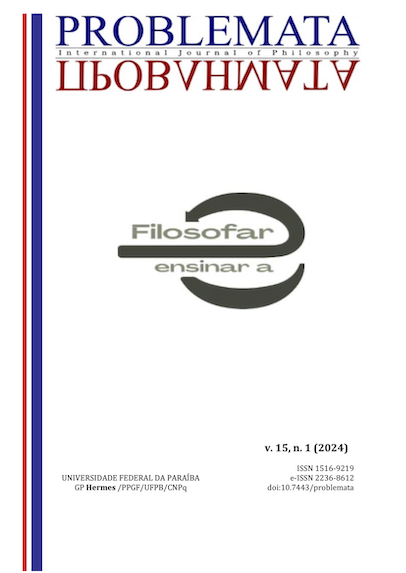AUTONOMY AND HETERONOMY IN ETHICS AND RIGHT ACCORDING TO KANT
DOI:
https://doi.org/10.7443/problemata.v15i1.68577Keywords:
Freedom, Will, Choice, Duty, VirtueAbstract
Kant distinguishes ethics from right since ethics demands that action happens objectively and subjectively determined by duty, while right demands only that action objectively happens according to duty, although it subjectively allows the subject to be pathologically moved by inclinations. Autonomy demands two things simultaneously: objectively, the duty must result from practical reason; but, subjectively, the motive of the action must be respected for duty. The juridical duty comes from external legislation, it fulfills the objective condition because it stems from the determination of the form of external relation between the choices by the will, but it does not have to fulfill the subjective condition, because it is indifferent regarding the motive for the choice to carry out the action, provided the action be externally in conformity with duty. Nevertheless, as the internal legislation also refers to juridical duty, it is possible to subjectively follow the juridical law out of respect but provided that the juridical duty be converted into an indirect ethical duty.
Downloads
References
ALLISON, H. E. Kant's Theory of Freedom. Cambridge: University Press, 2009.
BERND, L. Whence Public Right? The Role of Theoretical and Practical Reason in Kant’s Doctrine of Right. In: TIMMONS, M. Kant’s Metaphysics of Morals: Interpretative Essays. New York: Oxford University Press, 2002, p. 159-184.
CARANTI, L. Kant’s Political Legacy: human Rights, peace, progress. [S.l.]: University of Wales Press, 2017.
GUYER, P. Kant. London, New York: Routledge, 2015.
KANT, I. Gesammelte Schriften (Akademie-Ausgabe), Berlin, 1900 ff.
KERSTING, W. Wohlgeordnete Freiheit: Immanuel Kants Rechts- und Staatsphilosophie. Berlin: de Gruyter, 2007.
RIPSTEIN, A. Force and Freedom: Kant’s Legal and Political Philosophy. Cambridge, Mass.: Harvard University Press, 2009.
WILLASCHEK, M. Which Imperatives for Right? On the Non-prescriptive Character of Juridical Laws in Kant’s Metaphysics of Morals. In: TIMMONS, M. Kant’s Metaphysics of Morals: Interpretative Essays. New York: Oxford University Press, 2002, p. 65-88.
WILLIAMS, H. Kant's Political Philosophy. New York: Saint Martin's Press, 1983.
Downloads
Published
Issue
Section
License
Copyright (c) 2024 aylton barbieri durão

This work is licensed under a Creative Commons Attribution 4.0 International License.
Authors who publish with this journal agree to the following terms:
- Authors retain copyright and grant the journal right of first publication with the work simultaneously licensed under a Creative Commons Attribution License that allows others to share the work with an acknowledgement of the work's authorship and initial publication in this journal.
- Authors are able to enter into separate, additional contractual arrangements for the non-exclusive distribution of the journal's published version of the work (e.g., post it to an institutional repository or publish it in a book), with an acknowledgement of its initial publication in this journal.
-
- Authors are permitted and encouraged to post their work online (e.g., in institutional repositories or on their website) prior to and during the submission process, as it can lead to productive exchanges, as well as earlier and greater citation of published work (See The Effect of Open Access).





